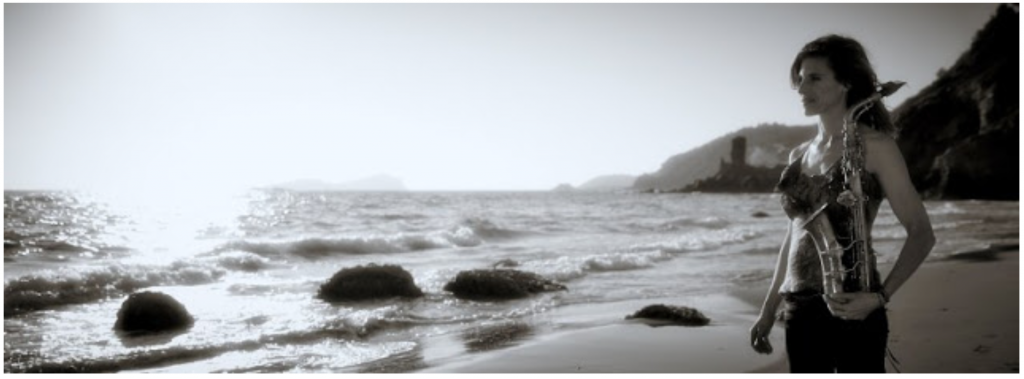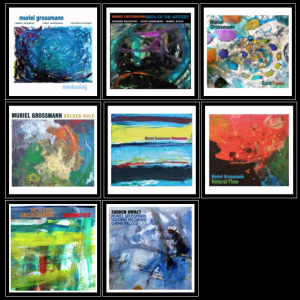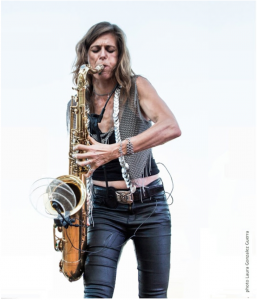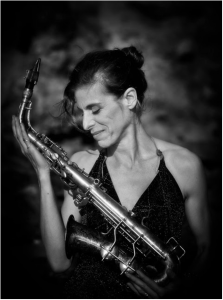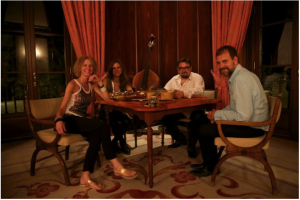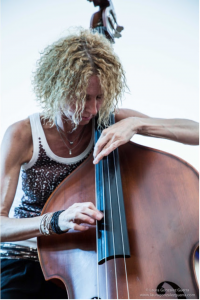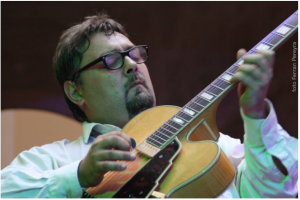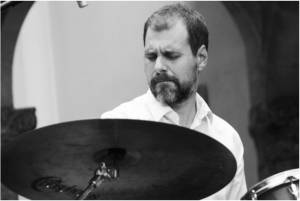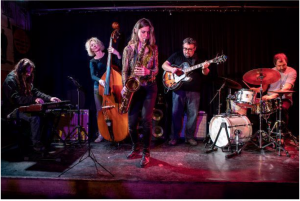Muriel Grossmann:
“The female spirit of Jazz”
By Enrique Farelo.
Born in Paris, settling in Austria as a youngster and moving to Barcelona in 2002, she settled permanently in Ibiza in 2004, marking a before and after in her career as a composer, saxophonist and leader of her own group.
Since 2007 there are ten albums signed under her name from Homecoming Reunion (DreamlandRecords 2007)to the acclaimed Golden Rule (DreamlandRecords 2018), including Here And Now (DreamlandRecords 2008),Quartet (DreamlandRecords 2008), Sudden Impact (Dreamland Records 2009), Birth Of The Mystery (Dreamland Records 2010), Awakening (Dreamland Records 2013), Earth Tones (Dreamland Records 2015),Natural Time (Dreamland Records 2016), and Momentum (Dreamland Records 2017).
Portadas de los discos de Muriel Grossmann
All of her albums have followed an artistic line very similar in terms of the design, their covers and they have had solvent musicians such as Viennese Gina Schwarz on double bass and Serbian Uros Stamenkovic on drums, in her last three works. Above all her faithful Serbian squire, the guitarist Radomir Milojkovic who has almost never missed his appointment, accompanying her in most of her works.
Her solidity, her commitment, her spirituality and having very clear ideas, are the intrinsic characteristics when evaluating her music.
foto © Laura G. Guerra
Enrique Farelo (E.F.)When was it “born” in Muriel Grossmann the desire for music and what people influenced or motivated you?
Muriel Grossman (M.G.)Music has always been a very important part of my life. My parents are very fond of art and in particular, my father collected classical music vinyls throughout his life. At the age of five they proposed to me that I choose an instrument. I chose the flute. And that’s when my career in classical music began, a stage that has lasted twelve years. I remember well how, from an early age, I practiced the flute every day improvising melodies; it was one of the things that brought me greater well-being. My motivation at this stage was my flute teacher, as well as listening to musicians like Jimi Hendrix and of course those special friends who were music fans around me.
E.F.You were born in Paris but it was in Vienna, where you lived in your youth. Were you interested in jazz or classical music at that time, considering that nearby Salzburg is the home of Wolfgang Amadeus Mozart?
M.G.Vienna and Austria are the cradle of classical music. The whole city breathes music and you also feel it in its imperial style, its dances and its traditions. It was a privilege to be able to grow up in a city where art is promoted and which stands out for its love of culture and music. At first, I played only the flute and studied classical music, but at the age of twenty one I started playing the alto saxophone and one thing led to another. Suddenly Charlie Parker became more important in my life than Mozart. My interest in jazz and saxophone began to expand as I listened to the news of the moment and was acquiring more experience with the bands I played with.
E.F.Golden Rule: “Do onto others what you want them to do onto you”. In this your last work you propose the golden rule of spirituality and that any religion would embrace this without hesitation in this age. Is Golden Rule a tribute to religion (to anyone), to spirituality or philosophy?
M.G.I have composed Golden Rule with the idea of approaching each situation of every day with the reflection of our thoughts, words and actions being consistent with this “Golden Rule”. I think that this spiritual concept is the key, the basis and the essential agreement for a humanity that wants to live in the way it deserves. Because our nature is human!
E.F.“Straight action without hope of reward” is a phrase taken from the Hindu holy book Bhagavad-gītā (part of the epic text Mahábhárata). Could this phrase be another golden rule?
M.G.We need to use our intelligence to extend our compassionate nature. Intellectual knowledge alone does not help us much if the mind is not disciplined. That is why the knowledge of the mind, its nature and emotions should be taught at school, be guided by appropriate people and be addressed in different ways over and over again.
I have seen the success and benefit of using the golden rule at ‘Universal Mandala’. We practice it daily with the children. With this constant practice you can see success very well. We ask the children if they like to be treated kindly and what kind of school, what kind of environment they want to come to every day. Little by little throughout the year we are developing a guide that leads them to discover for themselves that sharing or speaking kindly with their colleagues is reward enough. We call them “gardeners of peace”. What we sow is what we collect. In this way they understand what it means to “sow” in word and action to gather well-being, happiness and peace. It is a process that is integrated very naturally because it is centered on the “I”, that is, on what I want.
Altruism is a fantastic attitude but unfortunately it often remains in the intellect, because it is very difficult to satisfy our gigantic ego, which we have nurtured for centuries.
The golden rule really says nothing of reward, it only brings us closer to the understanding of empathy and the recognition of the potential of goodness and wisdom in other beings. If we could relate and approach others with the thought that we have a being with an unlimited potential of wisdom and kindness in front of us, we would be acting in a responsible way. That is the base. The teaching “Straight action without hope of reward in return” I see more useful for people already advanced in the way of altruism. With an investigative mind you can easily see that we are rewarded by our righteous actions, every effect comes from a cause, everything comes from something, just as our actions have a before and after. With a little work towards conscious attention you can start to see very well why the things that happen to us, happen to us. With time and practice, our daily life would become easier and our mind clearer.
photo © Christoph Schubert
E.F.At what moment do you feel the call of the spiritual? Is it influenced by your admired John Coltrane?
M.G.I feel and think that I was born, like everyone, with a good heart. But at the young age of 8 while watching a documentary about trawler fishing on television, I realized the incredible barbarities that were being committed to dolphins. There, at that moment, I made the decision not only to be a vegetarian, but also to do as little damage as possible to the planet; and this is what I have tried to integrate in all my decisions, either in my work or where I put my economy, or where I buy and what I buy. I try to live causing the least possible harmful impact by making responsible decisions for the whole planet and being an example for others.
Listening and learning from John Coltrane has given me a sense of relief and security on my way. John Coltrane is for me, one of the most important musicians that humanity has been able to know. He was a great conciliator capable of uniting different styles, cultures and genres reinventing himself again and again in short periods of time with great political awareness and deep spirituality as well as being recognized as an exceptionally humble man, as were Alice Coltrane or Pharoah Sanders.
E.F.Is our civilization, as we understand it, reaching the end of a cycle because of our contempt for life and our lack of conscience?
M.G.Today we see the consequences of a long period of neglect of a population exceeding 7400 million inhabitants.
Everything is a matter of focus. Being kind, responsible and compassionate, we feel naturally well and we want good for all, but we suffer tremendously, when we see others suffer.
They have begun to promote a lot of environmental issues, the use of renewable energy, the need for recycling or reducing the use of plastic, among other initiatives. At last it seems that we started to become aware. But education, care and knowledge of the mind, is essential. We are taking the first steps in a world that still nourishes in excess the world of senses and external expansion, forgetting the inner world and internal expansion. If we add to this that in this avatar we are dominated and manipulated by giants only interested in gaining wealth, control and power, it is clear that our work and practice towards the expansion of consciousness is duplicated. In addition, we are all in different processes of consciousness and regrettably perceive the facts in a linear, separate and independent way, without fully understanding that everything can be changed with words and responsible actions if we persist in it.
E.F.You are a music teacher in an educational center in Ibiza, Universal Mandala. What exactly does this center consist of and to what extent does it influence your music?
M.G.It is an educational center for children that I believe is laying the foundations of a new paradigm in education. An exemplary center. When my children were at the schooling age, I wanted to find a different education for them, an education that would train their minds to be cooperative, reflective and empathetic human beings. Beings prepared to use their potential for the good of our planet and the species that inhabit it, preserving the good of all our great human family. I wanted them to be sentient beings aware of their responsibilities. All this I found in Universal Mandala. Belen Köhler, its founder, is an exceptional visionary. When I met Belén and her educational project, I understood right away that in order for this form of education to reach more people, I had to collaborate with it in all possible ways. Therefore, it was natural to bring the music and the understanding and study of it to the children of this center from the philosophical and educational principles of Universal Mandala. The trainings offered by Belen Köhler opened me to understand the interdependence and interconnection of all things and their origin, as well as how to live in a more beneficial way for all, that has made me refine more with time as being human.
E.F.The portal http://ukvibe.org/awards/best-jazz-albums-of-2018/) designates Golden Rule (RR GEMS Records 2018) as the best album of the year 2018 in the vinyl version. Why did you choose vinyl for publication to the detriment of the digital format? Are there musical differences with respect to the subsequent edition on CD?
M.G.Golden Rule is a natural continuation in musical and personal evolution. During the years that Radomir Milojkovic and I have worked together we have noticed a great attraction towards certain musical elements and we have filtered and deepened a lot in them. It was a gift to be able to release the album on vinyl thanks to the proposal of Valentine and Dimitri of the record label RR Gems Records. They have believed and bet on the potential of our music and through their effectively directed promotion we have understood that there are indeed lovers of this music. We are truly grateful. It has formed a fine cooperation and deep trust between us, so much so that in the autumn we will release a new album on vinyl. This new album will be a continuation in the evolution of Golden Rule, just as this was an evolution that began with the song ‘Peaceful River’ (which can be found on the album Awakening), through the albums Earth Tones, Natural Time and Momentum.
E.F.Speaking of product, all your albums are released by DreamlandRecords Studios. How important is your figure in this record label?
M.G.Dreamland Records is our record label, which we have formed as a vehicle to propel and promote our musical visions. We wanted maximum freedom of music and design.
E.F.The artistic design of the covers of the discs gives character and personality to the discs, making them an attractive product and an indicator of what they contain. Who designs the covers of your records?
M.G. It’s me who designs them, using the paintings I produce at home with my children Ayelén and Iassù.
Painting is a hobby, a game with colors and shapes and we have always thought they work well in reflecting our sound.
foto © José Luis Luna Rocafort
E.F.The latest works, Natural Time (2016), Momentum (2017) and Golden Rule (2018) make up a trilogy formed by the same musicians as a stable formation. Are they a turning point in the music of Muriel Grossmann?
M.G.We think that the music we play has been formed with the development of each album, by an evolution, maturing through this deep and continuous work. It can be said that it is the music of these albums that has given us the greatest satisfaction in terms of harmony, rhythm, melody and subliminal messages.
E.F.As for the group. Could you tell me what work and effort (referring to rehearsals, concerts etc.) is there involved for the final product of the record?
M.G.Radomir and I like to rehearse and are able to as we are both based in Ibiza, but we are not very satisfied with the fact that the members of the band are at such a distance.
Of course we are very lucky that at least Uros is with us for three months each year and we can during this time, every weekend, create a musical laboratory where we elaborate the themes, the structures and the rhythms. We think that this is how the sound of the band is formed.
It is also our great fortune to be able to play alongside a talented musician like Gina Schwarz, who easily integrates into the group and who also contributes important ideas for the sound of the band.
The work of editing music is done by Radomir and myself. We are the nucleus of this band. We work like fine machinery with a good ear. We spent hours and hours recording the drones (instruments that serve as sound background for the formation), a whole orchestra of traditional instruments from all over the world, over its sound carpet the band can express the true character of the compositions.
Gina Schwarz, foto © Laura González Guerra
E.F.Gina Schwarz, Uros Stamenkovic and especially Radomir Milojkovic are the members of your current formation. Could you introduce us to those fellow musicians and how did you recruit them for your project?
M.G.With Radomir I have been working for a long time, we understand each other deeply on a musical bases, we recognize what our music needs to be and have, from the notes on paper to the final product. We love to play together and discover the new and old paths that make jazz such great music. I always admired his dedication, his knowledge and his hard work. He is a truly extraordinary musician with an extensive vision.
I know Gina from my days in Vienna, she is a musician with character that can adapt to any musical situation. So, when it came time to form a new band, I knew whom to call.
For a long time I’ve been looking for a drummer for the new musical journey I wanted to start, and I found it in Uros. He understands the music and the role that this music needs.
Radomir Milojkovic, foto: © Ferran Pereyra
E.F. Your work as a saxophonist has a specific weight with unquestionable value equally as an instrumentalist as well as composer. How is the day to day in both fields?
M.G.There is a vast field to explore in each area. It takes dedication, tenacity, persistence and daily work. To compose I focus on the subject I want to convey so that the message is transported through the music. This is how I do it when new topics or messages demand it.
E.F.What time do you dedicate to the instrument per day?
M.G.I want to spend more time on instruments every day, because it never seems enough.
E.F.Is loneliness an issue as a composer?
M.G.No way! I enjoy the creativity flow process! In the same way of time used practicing on your instrument, it is a time of introspection revealing potential limits, a field open to creativity.
Uros Stamenkovic, foto: © Ferran Pereyra
E.F.Do dreams influence when creating your music?
M.G.This is a very interesting question, really. My dreams so far are manifested as a mix of day to day situations and often reveal in the form of adventures. My days are full of responsibilities. As soon as I can get some extra time, I would like to investigate dream yoga, to be able to take advantage of my dreams more consciously.
E.F.With the importance that you have been acquiring throughout your career, do you think that you should have greater recognition?
M.G.I would like more people to enjoy my music.
E.F.In what stage or stages would you have liked to perform and have not done it?
M.G.In many, especially jazz festival venues or small theaters. I would like to play in more countries and continents.
E.F.What are the musicians that have most marked your style?
M.G.John Coltrane, Ornette Coleman, Alice Coltrane …
E.F.What have been and are your favorite musicians in current and past jazz?
M.G.Lester Young, Illinois Jacquet, Charlie Parker, Stanley Turrentine, Count Basie, Duke Ellington, Cannonball Adderley, Jimmy Smith, Lou Donaldson, Rusty Bryant, Julian Lee, Jazz at Lincoln Center Orchestra, Melissa Aldana, Ben Patterson, Joan Chamorro and their projects with emerging musicians , especially with Carla and Andrea Motis and Abril Sauri, Christian Lillinger, Robert Landfermann etc. …
E.F.What music have you been interested at the margin of jazz?
M.G.World music in general, Traditional music from India, Africa, Tuva, Soul Jazz, Gospel, Blues, R & B .…..
E.F.In another order of topics, what readings enrich your work as a musician? Are you interested in esotericism, mystery or parapsychology?
M.G.What I enjoy deeply is reading books of Buddhism or books of physicists like Stephen Hawking, Albert Einstein … I am reading continuously. Right now, I am reading the book ‘Sleeping, dreaming and dying’, an exploration of consciousness with His Holiness Dalai Lama.
E.F.Your music is a search for commitment and has a certain level of complexity. Who do you think is it directed to?
M.G.Well, we see who it is reaching. People with a love of John Coltrane’s music and spiritual Jazz, but when we play live, it is always incredibly well received by the public. Right now, I see it more as a matter of scope.
The music we play is aimed at all audiences. People like beautiful melodies, they love a rhythm that moves them and puts them in a good mood. But music can also be intellectual, complex and with a rhythm that moves you and takes you inwards, not just outwards.
E.F.Following this path and taking into account that society is directed towards superficiality, easy money, the media product and immediacy, what future do you see for jazz on the national and international level?
© Peter Purgar
M.G.I think that the word jazz should be better defined. If we talk about good music or bad music, I think that the good one is the one that is and persists throughout time, and this has no geographical limit. If music education, introspection and deep study in music were given both at home and at school this music could be maintained at a more widespread level. Jazz is a very small word for such a broad music. What can be jazz these days, could be deceptive for some people. On the other hand, when you do not label something, it is difficult to say what it is.
Everything in this world has a word that defines it and with Jazz it is not different. If you say you want green tea and they bring you coffee, if it does not matter what name you call it, they would bring you any liquid.
Something that is so many things, is difficult to explain and Jazz is considered many things. This can confuse the people who listen to it; but these are the facts.
E.F.Are you one of those who think that today there are a significant number of jazz musicians and few ears to appreciate them?
M.G.I think that today, due to the possibilities of YouTube and other online platforms as well as the speed of information flow, music can reach many ears. I also see that there are a lot of people who are very grateful to be able to enjoy it. But an important thing for jazz is to know what it was and go further to know what it is today. This is difficult, because it seems that the two tracks are in constant conflict.
People want to hear something new and for that it takes a lot of experimentation and many tests, which may cause people to be impatient and loose focus. On the other hand, the audience also wants to hear a beautiful melody well performed. Bach’s music is approximately 300 years old, but it is still played today and without much change, the same should be with Louis Armstrong, for example. Life and music are always moving and move because they come from something, because something has happened before, as history clearly shows.
E.F.Bach’s music is 300 years old, but it is still played today and without much change. Does this phrase of yours point to an objectivity of Music or does this not really exist, but what really exists is the value that time and human understanding give it?
M.G.Bach established the standards of classical music a little over 300 years ago. Louis Armstrong did the same. Established the standards for jazz like swing, or blues … and all the innovators, that came later as Charlie Parker, John Coltrane or Ornette Coleman deepened these standards. The same happened with the musicians who came after Bach. They continued and deepened their vision and the standards of classical music.
If you put the music in the context of the moment it was created and give it the historical perspective of today, it is the closest to an objective point of view.
I have not listened to Louis Armstrong in person, but I have listened to many recordings. From Bach we have the notes, but the interpretation is contemporary. Human understanding and the passage of time sometimes generalize and standardize things and even, in some cases, simplify things. We always tend to look at the icons without paying attention to other great musicians in the shade. Everything is there and much more, only behind, hidden.
Therefore, music has to do more with imagination and the narrative and is always about that final framework. For musicians it is important how it is done, but for the listeners it matters more how it is presented, how it sounds, how it makes them move. Music is really a complex language capable of transmitting much more than a phrase with spoken words. We must not forget that the hidden intention always has a fundamental effect.
E.F.What projects do you have in mind for the near future?
M.G.Right now, I’m very close to start mixing the next album that will come out in vinyl and CD this fall. During the summer we will record a new album for 2020 while we play here on the island of Ibiza immersed in a season full of local concerts and festivals outside the island like: the Vijazz in Vilafranca and Inca Jazz Festival in Mallorca and then jazz club Porgy & Bess in Vienna, We Jazz Festival in Helsinki and then Tallinn in the autumn. In March we have planned a great concert with renowned musicians from the United States, of which you will soon learn more.
Thanks for your support and these wonderful questions.
Interview and text: © Enrique Farelo, 2019
Photographs: copyright at the bottom of each photograph

